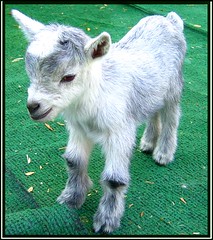
In patients with hereditary antithrombin deficiency, a condition which is estimated to affect over 200,000 people in Europe, Canada and the United States, inadequate production of the protein antithrombin can increase susceptibility to excessive blood clots. This is dangerous because if the clot breaks free and travels to the lungs or brain, it can cause serious and sometimes fatal complications. The problem is human antithrombin is in short supply. The solution?
GTC Biotherapeutics, a Massachusetts company, has genetically engineered goats to produce a human form of the anticoagulant protein antithrombin in their milk. Once extracted from the goat's milk, the protein (which they've named ATryn) is indistinguishable from the antithrombin produced in humans. The goats have been carefully bred to maximize milk production, so that they produce as much of the drug as possible. They are, in other words, living drug factories. Thomas Newberry, the vice president of GTC Biotherapeutics, explains:
"The mammary gland itself has developed naturally to efficiently express a variety of proteins as nutrition for offspring...Our technology simply provides an extra bit of coding so the mammary gland also makes a protein with human therapeutic value."
"As an example, if you were to take all the donated human plasma in the U.S. and devote it to making plasma-derived antithrombin you could get about 100 kg per year," Newberry said. "We can produce 100 kg per year of ATryn from about 150 goats."
As an added bonus, this new method..
..could slash the price of manufacturing protein-based medications, which are notoriously expensive, allowing drug makers to churn out affordable treatments for exotic diseases.
Although ATryn has already been approved for use in Europe, if approved by the FDA, it will be the first medication made by a genetically modified animal to be sold in the US.
For any of you who might be freaked out by this, realize that most of us have already taken drugs produced by another organism. Many antibiotics are made by bacteria.



